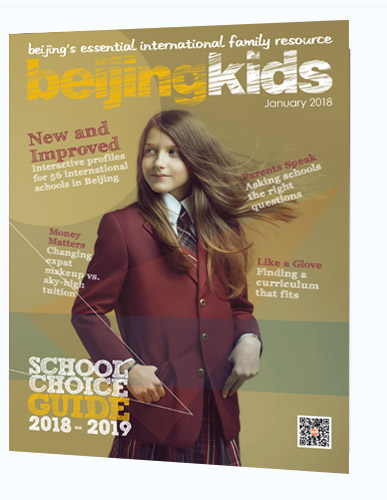The Kobiolka family consists of Georg (father), Michaela (mother), and their three children, Jan (18), Tim (17) and Julia (15), who all are students attending The British School of Beijing (BSB). Since August 2007, the family moved to Beijing from their homeland Germany, gradually getting on with life in Beijing. Jan will soon graduate this year, while Tim and Julia are currently in Year 13 and Year 11 respectively. As to the main reason that they choose BSB for their three children, Georg and Michaela say the broad range of different subjects and the very international community BSB offered is the main reason, and also the children feel comfortable in the school’s environment, which Georg and Michaela believe has helped their children achieve success. They are happy to see their children becoming very open-minded and confident throughout their tenure at BSB.
Favorite part of school life at BSB
Tim: Interacting with and learning about different cultures
Best project/activity that you’ve done so far
Tim: The student-led Myanmar project that provides educational support to underprivileged children in Myanmar
Any dream project you want to do?
Tim: Another project like the Myanmar one, with an even wider range for assisting unprivileged children.
How is the ENC helping you prepare for college?
Tim: The ICT course I learned during IGCSE led me into Computer Science, which I wish to pursue through university.
Best life lesson so far you’ve learned in the class
Julia: Completing given tasks in advance
Funny memory with your best buddy while doing a class project
Julia: Regular opportunities to foster great social relationships whilst completing class activities.
Curriculum Spotlight: The English National Curriculum (ENC)
The ENC was first launched in 1988 by the British government and is used by all schools in England, Wales, Northern Ireland, and by thousands of British Curriculum schools all over the world. We asked the principal of The British School of Beijing (BSB), Shunyi, Richard Thornhill, to tell us more about the English National Curriculum (ENC).
Thornhill says “the ENC is often characterized by the terms ‘broad and balanced’ as, up to the age of 14, students study the full breadth of subjects that are needed to help them develop into well-rounded citizens of the future as well as allowing for 21st century approaches to teaching in areas such as STEAM and the Performing Arts.”
What is unique about the curriculum?
It is highly structured, from the age 3-14, with progress measures throughout this time, so that teachers and parents know exactly how well a student is achieving and being taught. Pupils’ progress is benchmarked against the expectations from the curriculum and all other ENC schools. After the age of 14, students enter two years of preparation for the (International) General Certificate of Secondary Education (IGCSE) examination, taken at age 16.
How is it applied?
The ENC is divided into six ‘Key Stages’ (KS 0 -5), which are structured to build on each other to ensure progression and the highest rigor in standards achieved.
- Key Stage 1: Year 1-2 (Ages 5-7), Key Stage 2: Year 3-6 (Ages 7-11)
Key Stage 1 and 2 cover the rest of primary education to age 11, with regular assessment against international benchmarks, and laying the ground for secondary school and preparation for university and careers in the future. - Key Stage 3: Year 7-9 (Ages 11-14)
This stage builds up as children make the transition to secondary, and it encompasses the deeper study of the same core and foundation subjects. - Key Stage 4: Year 10-11 (Ages 14-16)
Students take the IGCSE qualifications, the core of subjects, while they are guided in their choice of a suite of other wide-ranging disciplines. - Key Stage 5: Year 12-13, collectively known as Sixth Form (Ages 16-18)
For their final years of school education, the British system is more diverse. Students may choose to follow the narrower and more focused A level program, which is well accepted by universities, but more and more schools are now choosing the IB Diploma program.
How well does this education system prepare students for the real world?
The ongoing development of the curriculum to encompass skills that employers are seeking, such as leadership, teamwork, problem-solving, global awareness, digital literacy, breadth of thinking, and creativity give the ENC high standing when compared to more linear ways of learning.
The ENC also places a premium on personal, social, health, and economic education which, alongside the framework of academic excellence, respect, and good manners which typifies the system, ensures personal development is also at the heart of education.
Where is it offered?
There are very few major cities where one of the 30,000 schools using the British curriculum model cannot be found. It is well worth looking into school websites to check this out because the school name may not readily provide a clue. The two British Schools of Beijing in Sanlitun and Shunyi both offer the ENC.
Photo: Dave’s Studio
This article originally appeared on p20-21
of beijingkids School Choice Guide 2018-2019.





